The Red Thread Read online
Page 17
“I’m going to get a home pregnancy test.”
A wave of nausea spread across Susannah and she swallowed hard. “I want the baby in China.”
“Fine. But this is our baby too.”
“You’re better with children like Clara. You don’t understand what it’s like for me to watch her. To feel the way I do.”
For the first time, Carter looked at her. “What kind of mother are you? What kind of person?”
“I know,” Susannah said. She wondered if she might throw up, right on her grandmother’s Persian rug. Unsteadily, she got to her feet. “Please don’t hate me,” she said.
“God,” Carter said, “I wish I could hate you. That would be easier somehow. But I love you.”
Yes, she was going to throw up. The bathroom seemed an eternity away. Clutching her stomach, she closed her eyes and bent over. But instead of vomiting, she felt something warm trickle down her legs. She opened her eyes and saw a beautiful stream of blood. Such relief came over her that she had to sit.
“Look,” she said, trying not to sound happy.
Carter nodded. “Well then,” he said.
She could hear the disappointment in his voice, but she didn’t care.
Carter pointed. “The rug,” he said.
Susannah touched the dark red that stained the pale pink and powder blue birds beneath her.
“It’s okay,” she said. “It’s fine.”
NELL
Downstairs in her in-law’s townhouse on Louisburg Square in Boston, Nell could hear the violins of a Vivaldi piece, the clank of pans and dishes from the kitchen where the servants cooked and prepped Thanksgiving dinner, and the low chatter of all the Adamses: her mother-in-law Lizzie with a voice full of vodka and strangled with a triple strand of pearls; her father-in-law John’s drone; her sister-in-law Liza and her husband and three bratty children; her brother-in-law Trip and his snobby wife and their three bratty children; and her own husband Benjamin with his endless sailing adventure stories.
At this moment, she hated every one of them, including Vivaldi and the stupid gaggle of pugs her in-laws owned. Was a group of pugs a gaggle?
Nell was room-spinning drunk. She had come upstairs to throw up, but instead lay on her in-laws’ creepy bed with the heavy maroon-fringed canopy, enjoying her drunkenness. As a teenager, Nell had always liked the spins. She realized she liked them now too.
The bed smelled of her mother-in-law’s perfume. The smell made her queasier. She held up her BlackBerry and squinted at it hard. It took three tries before she could find the right number and manage to press the buttons to call it.
When Theo answered, Nell said, “I am so drunk.”
He laughed. “I can tell.”
“So,” she said, “how long does a girl have to wait for the boy she had sex with to call?”
“Nell,” he said in a voice that meant, Let’s not do this.
But she didn’t care. Two months earlier they’d spent the afternoon together in a hotel having fantastic sex. And he never called her or anything.
“I feel the way I did back in high school when I gave a boy a blow job and then he never asked me out again.”
“I don’t need to know that,” Theo said gently.
“Oops,” Nell giggled. She hadn’t meant to say that out loud.
“I’ve wanted to see you,” Theo said. “I have. But the shit really hit the fan here.”
“What?” Nell said, sitting upright so fast she fell immediately back down. “Sonia knows about us?”
“Sophie,” Theo said. “Why don’t we talk later? When you feel better.”
“No, no,” Nell said. She wanted to stay on the phone with him. “Tell me.”
“I came home that day and my old girlfriend was there with Sophie and…” Theo paused. “It is such a mess.”
“The one you love so much? The one who got away?”
“Yes,” he said. “And I’ve been sleeping on the sofa ever since. It’s such a mess,” he said again.
“Well, Happy Thanksgiving,” Nell said. “And I want to see you again when you straighten everything out.”
Theo laughed. “You aren’t making any sense,” he said. “Get some sleep.”
Then he hung up. Nell lay there, trying to figure out what to do next.
The bedroom door opened and Benjamin walked in. “What are you doing?” he asked.
He loomed over her. “Stop looming over me,” she possibly said.
“Oh dear,” he said. “Want a pot?”
She narrowed her eyes at him. “I do not,” she said. “I’m not going to be sick.”
“Cloris is serving hors d’oeuvres,” he said.
“Benjamin,” Nell said, and she was clutching at his pant legs now, “do you think I’m good in bed?”
He tried to step away from her, but she held on tight. “Of course.”
“I’m so drunk,” she said.
“I know.”
He stroked her hair, which Nell thought was very kind.
“Do you want to make love?” she said. She was crying suddenly. She couldn’t explain it, why she felt so sad.
“Why? Are you ovulating?”
“I don’t know.” Snot was running down her face and she didn’t even care. “I just want to do it, you know?”
“Later. Okay?” he said.
Nell nodded and wiped her nose on one of the decorative pillows.
“I just want a baby,” she said.
“I know,” Benjamin said.
He slipped off her shoes and covered her with the silk comforter they’d brought back from a trip to China. How ironic, she thought right before she passed out. I am covered by silk from China.
BROOKE
Every year, Brooke and Charlie did the same exact things to celebrate Christmas. They got a palm tree from Four Corners Farm and strung white blinking lights on it. They filled glass bowls with seashells they collected together from Elephant Rock Beach on Christmas Eve. They hung their stockings and each filled the other’s without getting caught. Then, on Christmas morning, they ate eggnog French toast and drank milk punch and sat together opening presents and made love under a blanket on the cold cold beach.
But on this Christmas morning, when Brooke came into the living room, she found piles of presents, all wrapped in pink foil paper with silver snowflakes and topped with enormous pink bows. A rocking horse stood in one corner. A Johnny Jumper hung from the doorway that led out to the deck. The seashells had been moved to who knew where and the tabletop held a bassinet instead, white wicker with pink and white gingham lining. A third stocking had been hung over the mantel. A tiny striped one, with silver bells dangling from the cuff.
“Ho ho ho,” Charlie boomed. He came in with two cups of his famous milk punch, frothy, the tops dusted with fresh ground nutmeg.
“What’s all this?” Brooke said.
“Baby’s first Christmas,” he said, sipping his drink. “I confess, I’ve done a lot of tasting already, darling. It’s just that I woke up filled with such…such joy. That’s the word. Joy. In fact, I was thinking of that for her middle name. Frankie Joy. Or maybe Billie Joy? What do you think?”
“I don’t know,” Brooke said. She tried to understand her confusion. Wasn’t this what she had wanted? Charlie on board? Then why did she feel so upset? Why wasn’t she delighted?
“Too clichéd, maybe? Like every adopted baby needs to have the name Joy or Hope in it?”
“It’s not that. It’s just…” She looked outside. “What the hell?”
Charlie grinned at her. “Finally! You noticed. I spent all night putting it together.”
It was a wooden swing set with a slide and a jungle gym.
“Good thing you never go in the garage,” Charlie was saying. “I had the boxes in there for weeks.”
Brooke pushed past the Johnny Jumper and stepped outside. The winter sun shone bright and silvery. She stumbled across the deck, down the stairs to the yard.
One of the dog
s followed her. He ran around in circles, barking at the curly slide.
“Charlie?” Brooke called. She needed to say something to him, to tell him it was too much. “Charlie?”
Inside the pocket of her red fleece bathrobe, one of his Christmas presents sat nestled in its small box. A double-heart-shaped picture frame, made of Italian mosaic tiles. Brooke had put her picture in one of the hearts and a black question mark in the other. The present seemed foolish now somehow. She had meant it to show him that there was room in his heart for both of them, her and the baby.
Exhausted, Brooke sat on one of the swings. It creaked noisily, then settled in place with a thunk. This should be a happy day. She knew that. But the feeling in her chest was nothing at all like happiness. It was the way she felt when back in college she and Charlie would be at a fraternity party and she’d catch sight of him talking to another girl. Or the feeling she used to get when she’d wait outside the locker room for him after a game and she’d watch women crowd around him. It was ridiculous to feel jealous of a baby. Of their baby. It was the opposite of what Brooke had feared. All this time she had worried that Charlie couldn’t share her with a baby when in fact it was she who couldn’t share him.
One of the dogs ran up from the beach, wet and cold, straight into the sandbox.
“Charlie?” she called again. Maybe they could stop it right now. Before they got their referral, before they saw that little pretty face. Fear ran through Brooke. All these years she had thought she wanted a baby, but now she saw that all she needed was Charlie. His love was enough for her. More than enough. It was everything.
Betsy, their third dog, came running from the beach too, with something hanging from her mouth. She went directly to Brooke and deposited a dead seagull, stiff with matted feathers, at her feet.
“Thanks, girl,” Brooke said. Why had she thought that they needed more than this: their house on the beach, their dogs, each other?
Brooke swung harder, pushing off with her feet. She hadn’t been on a swing since she was a little girl. She pumped her legs so that the swing rose higher and higher. When she was little, she used to think she could make the swing take off and fly. Wouldn’t that be something? she thought. To fly away?
“Charlie?” Brooke said, even though she knew he couldn’t hear her. All this time she had believed that it was Charlie who didn’t have room in his heart for someone else. Now she saw she had been wrong. She was the one whose heart could not open enough for two. She wasn’t sure why, but she knew it with certainty.
“Brooke!” Charlie said. He stood in front of the swing, and each time she pumped her legs and rose higher, she lost sight of him. “I love you!” he said.
He came into view, briefly. Brooke pumped her legs hard, and she rose up and up, until she could clearly see what lay before her.
SOPHIE
Sophie stood at the bedroom window and watched the first snowflakes of what threatened to be a nor’easter fall. The bedroom. Not our bedroom. Since that terrible day when Heather showed up in her ridiculous dancer clothes and pictures of a six-year-old girl in a tutu, Theo had been sleeping on the futon. He no longer even bothered to fold it back into its frame. Instead, he left it open and unmade.
He was there now. Usually they bundled up and ran outside during snowstorms. For some reason, the memory embarrassed her now. The snowball fights and snow angels and tiny Buddhas they built out of snow. The appearance of Heather and those photographs made Sophie embarrassed about her entire marriage.
The flakes were small and falling fast. Sophie used to know what made a snowstorm a blizzard; she grew up in Colorado. Wind speed. Size of flakes. Amount of accumulation per hour. And? Something else that she could not remember. Her brain these days felt all cloudy and thick.
A couple passed beneath the window, dressed in puffy bright-colored coats, holding hands. Sophie had to turn away at the sight of them. She sat on the bed and opened the drawer in the night table beside it. Rose smiled up at her. When the first envelope of photographs arrived from San Francisco, Sophie opened it and took one for herself. In it, Rose was dressed as a fairy of some kind for Halloween. Her face sparkled with silver glitter, stiff blue wings rose behind her. But it was her eyes that broke Sophie’s heart. They were Theo’s eyes. Same droopy lids and long lashes. Bedroom eyes. No matter how hard Sophie might try to talk herself out of the truth of this child, those eyes let her know that Rose was indeed her husband’s daughter.
A soft knock on the door, and then Theo’s voice. “Sophie? It’s snowing.”
When she didn’t answer, he knocked again.
“I know,” she said, closing the drawer.
“Want to take a walk?”
She did want to take a walk. She wanted to go out there and catch snowflakes with her tongue and put her mittened hand in her husband’s. She wanted the snow to erase everything that had happened the past few months.
“No,” Sophie said.
He didn’t answer for a bit and Sophie thought he had walked away.
Then he said, “Can I come in?”
Sophie thought of her mother, who taught high school English. She would say, You can, but you may not.
“Okay,” she said.
The door opened, and Theo stood dressed to go outside: his big olive green parka and lace-up snow boots and funny three-pointed hat.
“Come on,” he said.
Sophie shook her head.
Theo clomped over to her and sat beside her on the bed. The bed, Sophie thought, not our bed.
“You have to forgive me,” he said. “You have to.”
She tried to find the words that could capture his betrayal. But there were none. “Theo?” Sophie said instead.
“Please, Sophie. I’ve messed up bad. I have. It’s childish, the way I act when I feel pressured or boxed in. But you have to believe that I’m sorry. More than sorry. I’ll make it all up to you. If you let me.”
She put a finger over his lips to silence him.
“Theo,” she said again. “I’m pregnant.”
Even then, when he opened his mouth, she kept her finger there.
“Ssshhh,” she said.
Her husband wrapped her in his arms, his parka crinkling under her cheek. She had promised herself that when she told him, she would not cry. But here she was, crying. Hard.
“But this is good,” he was saying. “This is amazing.”
“I am so mad at you,” Sophie managed.
“I know.”
“No. You have no idea.”
Theo took her by the shoulders and looked right at her. He was grinning.
“Wow,” he said. Then he laughed and brought her back into a hug.
“Wow,” he whispered into her hair.
All of the things she had practiced for this moment melted away. Instead, she let her husband hold her like that and promise her things. Sophie unzipped his jacket and slipped herself inside. His sweater smelled like mothballs and smoke and the smell made her stomach roil. But she stayed there anyway.
12
MAYA
“They don’t buy the cow if the milk is free,” Maya’s mother said, shaking her head.
Day five of Maya’s visit home—if you could call her parents’ new condo with the pale blue wall-to-wall carpeting and framed prints of museum posters home—and her mother had succeeded in using every cliché known to man. Time to fly back East, Maya thought. Her mother had just run out of things to say to her.
“Go ahead,” her mother said, “roll your eyes. But I know that divorced women have a stigma about them.” She lowered her voice. “They’re easy. Fast. Mark my words.”
“Not to worry,” Maya said. “I’m dateless and therefore celibate.”
“Spare me the details of your love life,” her mother said, holding up both hands as if to stop traffic.
Maya sighed. Did her mother ever listen to her?
From where she sat at the counter, Maya could see into the small living room. On the sidebar
there, her parents had some kind of digital picture frame that flashed photographs of them on their various trips. Her father in scuba gear. Her mother with a margarita. Both of them standing next to a pygmy in front of a reed hut.
“Panama,” her mother said, pointing to the picture. “San Blas Islands. They are the second-shortest people in the world, after Pygmies.”
Before Maya could comment, the picture switched and suddenly she was staring at her own image on her wedding day. There she was in her knee-length vintage dress, a wreath of tropical flowers in her hair, her head thrown back slightly, a wide smile on her face. Beside her, gazing at her with so much love it broke her heart to see it like this, stood Adam.
“Surprise!” her mother said. “Your father took all of our old photographs and put them on CDs with a special machine he bought from the SkyMall magazine. You know the one in airplane seat pockets? We’ve found so many interesting items in there.”
Maya’s wedding picture was replaced by an underwater shot of a coral reef and colorful fish swimming.
Relieved, Maya relaxed a bit.
The underwater scene switched and a photograph of her father eating what looked like a giant beetle took its place.
“We’re waiting for this gadget that turns old record albums into CDs,” her mother said.
The next picture flashed on, and Maya’s breath caught. Looking back at her was her daughter, grinning under a sun hat printed with happy daisies.
Her mother saw the terror on Maya’s face and followed her gaze.
“Maya. Maya, I’m sorry. I didn’t think it would upset you. Time heals,” her mother said. “Doesn’t it?”
Maya stared at her baby. Her happy, breathing baby. No, she thought, it doesn’t. But before she could answer, her daughter was gone, replaced with a colorful sunset.
That night Maya dreamed that she fell into the giant saltwater aquarium that made up one wall of her parents’ guest room. She tumbled past the bright blue fish, past the fat yellow ones and tiny neon ones, until she landed at the sandy bottom. She woke, panting. In her dream, she had been trying to climb out of the tank, its slippery walls sending her falling again and again.

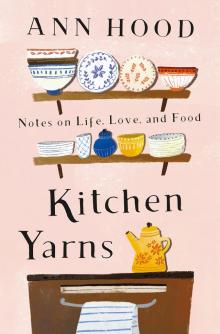 Kitchen Yarns
Kitchen Yarns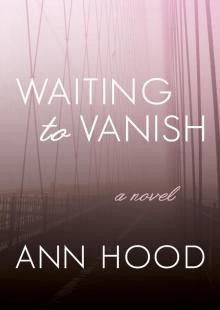 Waiting to Vanish
Waiting to Vanish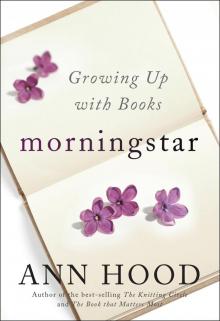 Morningstar
Morningstar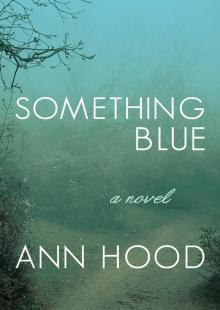 Something Blue
Something Blue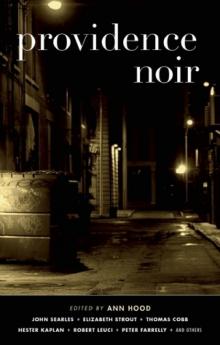 Providence Noir
Providence Noir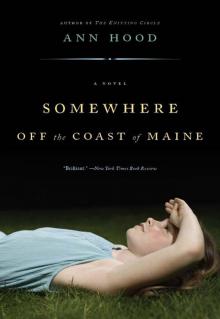 Somewhere Off the Coast of Maine
Somewhere Off the Coast of Maine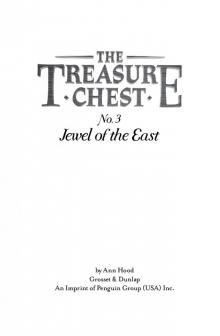 Jewel of the East
Jewel of the East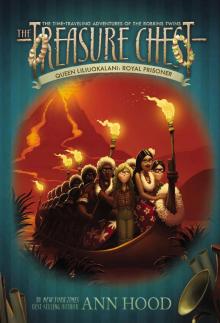 Queen Liliuokalani: Royal Prisoner
Queen Liliuokalani: Royal Prisoner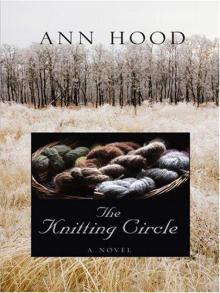 The Knitting Circle
The Knitting Circle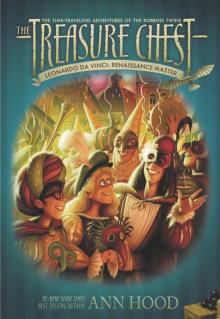 Leonardo da Vinci: Renaissance Master
Leonardo da Vinci: Renaissance Master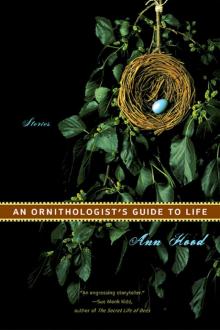 An Ornithologist's Guide to Life
An Ornithologist's Guide to Life The Red Thread
The Red Thread She Loves You (Yeah, Yeah, Yeah)
She Loves You (Yeah, Yeah, Yeah)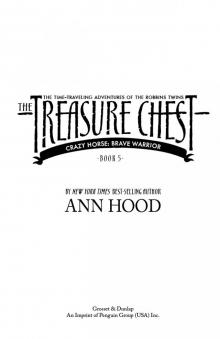 Brave Warrior
Brave Warrior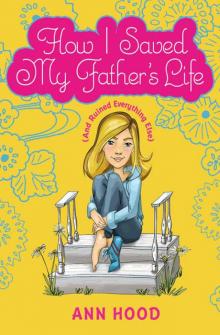 How I Saved My Father's Life (and Ruined Everything Else)
How I Saved My Father's Life (and Ruined Everything Else)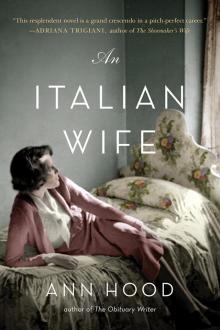 An Italian Wife
An Italian Wife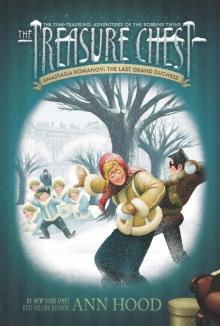 Anastasia Romanov: The Last Grand Duchess #10
Anastasia Romanov: The Last Grand Duchess #10 Prince of Air
Prince of Air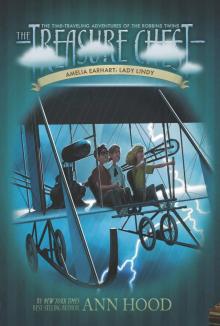 Amelia Earhart: Lady Lindy
Amelia Earhart: Lady Lindy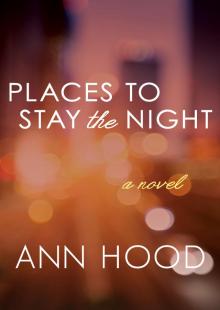 Places to Stay the Night
Places to Stay the Night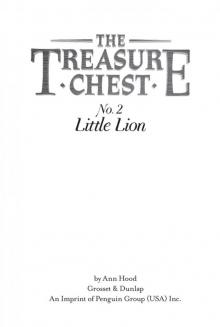 Little Lion
Little Lion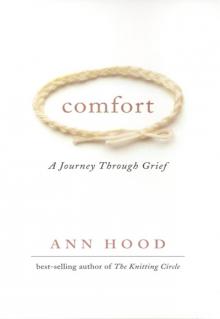 Comfort
Comfort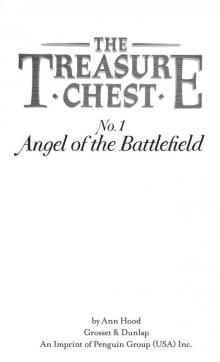 Angel of the Battlefield
Angel of the Battlefield